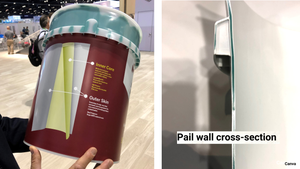Getting what you need from a compounder
March 1, 1997
According to Michael Rosenthal, executive vice president of The Plastics Group of America (Woonsocket, RI), the economics of manufacturing resin have forced major suppliers to narrow product choices and services while raising minimum order quantities over the past few years. "Basic resin types formerly available in 50 different grades are typically offered in only 10 formulations today," he estimates. What happens to designers who want less-than-truckload quantities of something more exotic than a plain vanilla resin? They often turn to custom compounders.
"Compounders' offerings are so diverse," he says, "that although you may be working with one already, you may be unaware of what others can provide." Some compounders specialize in serving distinct markets; others perform multiple functions that range from application development to purchasing excess inventory at the end of a production run.
Custom coloring is one of the most common services compounders offer. Although you may be doing this in-house, Rosenthal suggests you consider compounders as a secondary source, especially if you run into technical problems with a particular concentrate or resin. Another instance in which to consider compounded resins is when stock grades don't offer the exact combination of cost, properties, and processing parameters you need. Adding fillers and reinforcements can modify resin flow, warpage, impact strength, density, stiffness, aesthetics, and other characteristics.
In general, says Rosenthal, compounders provide a broader variety and greater specificity of material purchasing choices than are available from the majors. The key here is that resins can be modified more cost-effectively through this channel. Rosenthal recommends the following tips for getting the most out of this relationship.
1. Do your homework to find a compounder that best suits your specific needs. Compounders with stock lines of resin are often listed in buyers guides and reference sources. Some have also posted their offerings to Internet home pages. Although most are generalists, some specialize in certain types of resins or processes. For example, if you're looking for exotic materials such as a carbon-filled flame-retardant polycarbonate, you need a specialist. But this same compounder may not have the right cost structure to economically produce large volumes of commodity products such as talc-filled polypropylene.
2.Don't equate proximity with convenience. It's a common mistake to assume that a compounder in your area can get you quicker delivery and lower cost than one across the continent. Compare the results of your research. A little research and a few phone calls can save you thousands of dollars in material and weeks on delivery.
3.Consider reprocessors. These suppliers buy molding scrap, excess inventory, and/or postconsumer scrap, then reprocess it and sell it on the open market. Others will do this on a toll basis: they'll take your scrap, reprocess it to your specs, then send it back to you for a fee. They can also add fillers or perform modifications while the material is being reprocessed to upgrade the resin's properties before you reuse it.
Many recycled-material processors specialize in particular materials, depending upon established supply sources, such as plastic film and PET bottles. Others may have a special handle on broom bristles, straws, talc-filled PP molding scrap, etc. If you can find a reprocessor who's running what you need in large volumes, you can save a bundle.
4.Use compounders to upgrade virgin resin. Again, toll processing can be advantageous. If your current needs for an application change, but you have a long-term resin supply contract that you can't (or don't want to) eliminate, compounders will gladly modify that resin to your specifications for a fee, even though they didn't sell the virgin product to you.
5.Reduce delivery hassles. Compounders can often respond more quickly than the majors, especially on small orders. Some will work with you on a just-in-time basis, serving as an off-site resin warehouse. They can also represent a useful second source of supply, providing a level of insurance in critical supply situations and serving as a bargaining chip when negotiating with existing suppliers.
6.Take advantage of technical expertise. Most compounders have enough experience with resin modifications to be able to recommend specific compounded resins for new product development or for cost cutting and performance-enhancing replacements in existing applications. As an example, it is often possible to replace engineering resins with filled PP, cutting resin costs by 50 percent or more.
Compounders earn their living by finding less expensive solutions to the problem. Most compounders will also help a molder through the fine-tuning process, setting up optimum processing parameters and running test cycles.
You May Also Like


